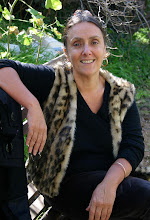The storyteller paused to look at the young ones gathered in the circle to hear the
Old Tales. The crone smiled her toothless smile and nodded to herself,
remembering the first time she had heard the stories told. A lifetime had
passed, but the words never changed . . .
"Sky
and Earth moved together in the Void. There they would have remained for
all time, but for the Chance that lives in Chaos. From Chaos comes the night,
from the boundless empty space comes the power of Nature."
Wide-eyed, the children listened.
“From Chance came a spark that gave rise to a wind that blew
between Sky and Earth, driving them apart." The old woman's arms rose in a
graceful arc, as they had when she had danced in the Temple as a novice.
Then, her hands came together, leading her body into a
crouch, impossibly supple for old bones. "Curling into a sphere, Earth formed
the solid matter on which we stand."
Again, the graceful arcing movement. "Spreading wide, Sky arched into the
vault of the Heavens above"
The children followed the storyteller's dance, entranced by
her magic.
"The space between they filled with their children."
"That's us!"
whispered the children.
The storyteller held up her finger for quiet, but she smiled
at the young ones. They moved closer.
This was the part for which they had been waiting, the story of their own
becoming.
"As their children came forth, Sky and Earth bestowed
gifts on them. To Men they gave strong bodies, for digging the soil, and
holding their loved ones. To women they gave strong hearts, for they are the
life-givers."
"Why?"
asked the young ones. "Why are Women
the life-givers?"
"Why does new life come forth from the Earth?"
asked the storyteller. "Why do we honour the Earth as our Mother?'
"Because Her
hills are like breasts!" called a bright-eyed child.
"Because She
feeds us!" called another.
"Because She was
there at the beginning and will be there at the end," said a third.
The crone nodded. "All of that is true."
The children smiled at their own cleverness.
"Listen now, and I will tell you the true reason that women
are the life-givers."
The children waited.
"Earth and Sky might have continued to bring forth Men
and Women, as many as were needed. Why did they give the life-giving power to
Women?"
The children considered her question with blank faces, frowns,
bitten lips. Finally, the old woman spoke again.
"It happened like this. The first Man and Woman came
forth into a garden between two rivers. In this place was food and water enough
for them to live forever. They swam in clear pools, slept in the Sun, and
supped on ripe fruits. All was well."
"What happened?"
asked a girl sitting at the edge of the circle.
"Time passed," said the storyteller. "Earth
and Sky began to grow sleepy. No more did they dance as they had when they were
young. No more did they bring forth children." Her voice conveyed the
sadness of the change.
"What happened?"
asked the girl again.
"A great and wise power came to the Woman in the form
of a serpent." The storyteller's
hands moved in front of her in gentle undulations, leaving tracks in the air like
the curving pathways of the snakes by the river.
"Did the serpent
bite her?" asked the girl.
"But, why didn't the serpent speak to the Man?' asked a
boy sitting near the storyteller.
"Because Men
cannot hear serpents speak," said the old woman, as if that explained
everything.





